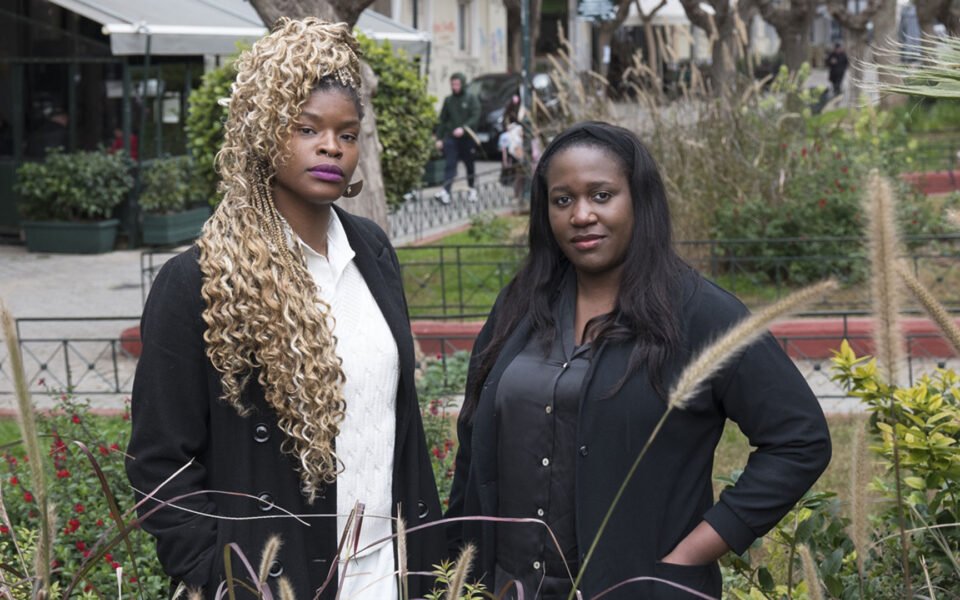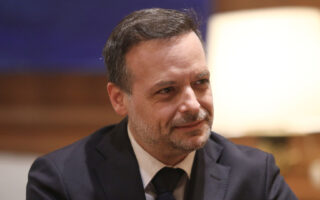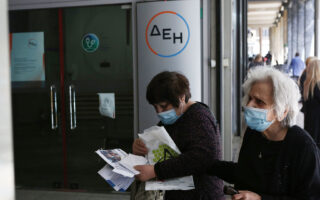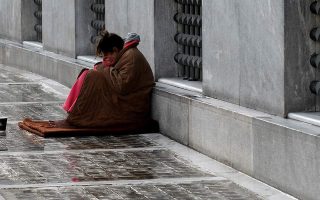‘How come you speak Greek? Can I touch your hair?’

“Let’s all play soccer: Greeks vs Foreigners,” said a young boy in the courtyard of the 23rd Primary School of Athens, floating the idea. As 10-year-old Grace headed towards the net with the confidence of a key player and the school team’s goalkeeper, one of her classmates said something that took her aback: “But you’re a foreigner, you have to go on the other team!”
“I still remember my tears and anger because I felt Greek inside, I was born and raised here,” Grace now says. “I haven’t touched a soccer ball since.”
Roughly 20 years since that incident – one of the many instances of social exclusion that second-generation Afro-Greeks can recall – Grace Nwoke, 29, a social anthropologist, together with her cousin Precious Obediah, 30, a digital marketing manager and web developer, have launched the platform Afrosocially.
“We want it to function as an interactive platform,” Precious tells Kathimerini. “We will feature all the African businesses in Athens and others with products of African origin, such as a Greek-owned mini market in the center of Athens, professionals of African origin – psychologists, doctors, nutritionists, etc. – organizations, associations and embassies.”
The two women came up with the idea about a year ago and have been building the platform while working their regular jobs. “We are literally exploring every corner of Athens to discover African businesses,” says Precious.
Registration will give those involved in the project visibility and the ability to network. “We want to reintroduce you to the African community,” emphasizes Precious, with her eyes gleaming. “We aspire to showcase the multicultural side of Athens with an emphasis on the African community: so when someone is looking for an Ethiopian restaurant for instance, they would know where to search.” But what is most in demand? “Undoubtedly the braids, as in hairdressers that know how to take care of our curly hair.”
The podcasts
As part of the project, which was initially supported by the Inco Group and later by Orange Grove, they have started to create podcasts about the journey of the African community in Greece, the racism that its members have experienced and the intergenerational trauma this has caused. “When diversity is visible in one’s physical appearance, discrimination is almost the norm,” notes Precious. “We hope that both people from African countries and Greeks will listen to them.”
“For most people, Africa is seen as a single entity, which of course is not the case: English-speaking West Africa, the French-speaking Maghreb, sub-Saharan African countries or South Africa are different; it’s an entire continent,” comments Grace. “They think of us all as same, as if the Greeks, the Italians and the Romanians are the same.”
In one of the podcasts that will go out on the platform within the next few days, Samsidin Idrissou, former president of the Pan-African Association of Greece, says it’s not uncommon have people ask things like “Are you from Ghana? I have a cousin in South Africa. Have you ever met him by any chance?” He says that “Greece was not a colonial country, so the people did not have knowledge of Africa.”
“My parents came from Nigeria to Greece to study,” says Precious. Her father studied English literature, her mother nursing. “My father never managed to work in his field; he couldn’t even do an internship without having Greek citizenship,” she says, “but my mother worked as a nurse.” Eight years ago and without having obtained Greek papers, her parents and three siblings moved to Ireland for financial reasons.
“Within six months they were all working and after about five years they all got Irish citizenship,” she emphasizes. “Now they come to Greece on an Irish passport; which is funny and sad at the same time, because they feel Greek.” Greece and Ireland, she says, “are night and day on an institutional level.” Despite being born and raised in Patissia, an Athens city-center neighborhood, she only acquired Greek citizenship in 2016. Despite everything, she is still in Greece. But for how long? “I’m thinking of following them, but I haven’t decided. For the time being I’m traveling a lot.”
‘Trapped’
Grace’s parents, on the other hand, are “trapped” in Greece with Nigerian passports. “My parents don’t have a permanent residence permit. They renew it every three years. Now they’re worried that they won’t be able to obtain it again next time because they haven’t completed the required working hours,” their daughter tells Kathimerini. Her father too, although he studied economics in Greece, never interned or worked in this field. “He’s always had a grudge over it,” says Grace. “But what cost my parents the most was not being able to attend my brother’s wedding last year, who lives in Luxembourg, nor my sister’s graduation in Manchester this year,” she adds. She is a Greek citizen since 2017 and plans to pursue a PhD in Greece or abroad. “I’m applying everywhere.”
“In the UK you say you’re British and no further clarifications are needed; it’s not even allowed to be asked about your identity,” says Precious. However, in Greece they are asked every day to justify their Greek identity. “You’re Greek, but where are you from?,” “how do you speak Greek so well?,” “do you feel comfortable here?” and “can I stroke your hair a bit?” These are the most common questions second-generation Afro-Greeks are bombarded with. “Initially, these phrases may seem innocent but they are forms of microaggression, which accumulates over time and burdens us psychologically,” notes Grace.
Growing up they experienced “everyday” racism so often that they initially normalized it. “Since I was little, I never questioned who I am and where I belong,” recalls Precious. Discrimination did not affect her. Now as an adult she has decided to respond to any inappropriate behavior or offensive comment, whether it is about herself or someone else. “I’m thinking ‘you stumbled on the wrong person or rather the right one,” she says with a subtle smile, “I believe that we should speak up.” Looking back, Grace is thankful she wasn’t the firstborn child in her family. “My brother preceded me in school, so when I first started, he had already paved the way. Everyone was saying, ‘She’s Bobby’s sister.’”
From the first generation to the change brought about by Giannis
In the 1980s and 1990s, when their parents arrived, Greek society was even more introverted. “They would walk down the street and people would stop them so they could touch them; many had never seen a black person before,” Precious describes. “At the level of human relations, the curiosity about the unknown prevailed, at the institutional level things were discouraging.” The previous generation was basically ‘invisible’ to the state. “Survival became their priority,” she says. “They put the dreams of their youth aside, they ran a small shop to make a living, they went to church and to their local association.” It took time for the agony of survival to turn into a good life, which in this case meant simply asserting basic rights. The coming together of Africans played a decisive role in this, such as with the creation of the first Pan-African Association of Greece or the Association of African Women. “Our generation managed to obtain certain rights, paving the way so the next ones.” If after turning 18, Precious and Grace had not gone on to university, the legal system at the time would have led to their deportation. “I’ve never been to Nigeria,” Precious says “and unfortunately I don’t speak the language; we grew up speaking Greek and English at home.” Grace understands the language, but cannot speak it. “My parents spoke the local dialect with each other, as they come from the same village, me and my siblings spoke Greek and we all used English to speak together.”
The political and socio-economic changes that took place in Greece had a direct impact on the daily life of Afro-Greeks, as diversity in their case is evident in their physical appearance. Both women still have fresh on their memories the time when Golden Dawn was in Parliament, a neo-Nazi group whose leaders are currently imprisoned for various offences, including murder. “I remember the widespread fear, especially among the boys in the family, who often avoided staying out late on the streets, or families who didn’t let teenagers play soccer outside till late,” Precious describes. “We were adults at the time, we had a better understanding, I was also quite active as a student,” adds Grace. “Meanwhile, social media and the internet had been leveraged and so there were widespread messages circulating warning ‘don’t go after 10pm to Omonia or Kypseli: there is an ‘attack squad’ – as the Golden Dawn groups were called – or a police raid,” because we were equally worried about Golden Dawn members and the police.”
Grace still remembers how “the police van would stop to make random checks on 15- and 16-year-old kids who were going to their sports training and, as they were not familiar with the legal system, the only identity document they might carry with them would be their birth certificate or a ‘family status certificate.’ Thesse were the kinds of people they busted.” That dark period, however, coincided with basketballer Giannis Antetokounmpo’s rise to fame, a personality destined to overturn many stereotypes, leaving its mark on Afro-Greeks – especially those living in the neighborhoods of central Athens. Until then the community did not have a hero of its own. “Thanks to Giannis, many children and adults started to dream again,” says Grace. “At the same time, however, his story exposed the hypocrisy of the Greek state: Giannis is one of us and we love him, you on the other hand that grew up two streets away, we don’t even see you.”





